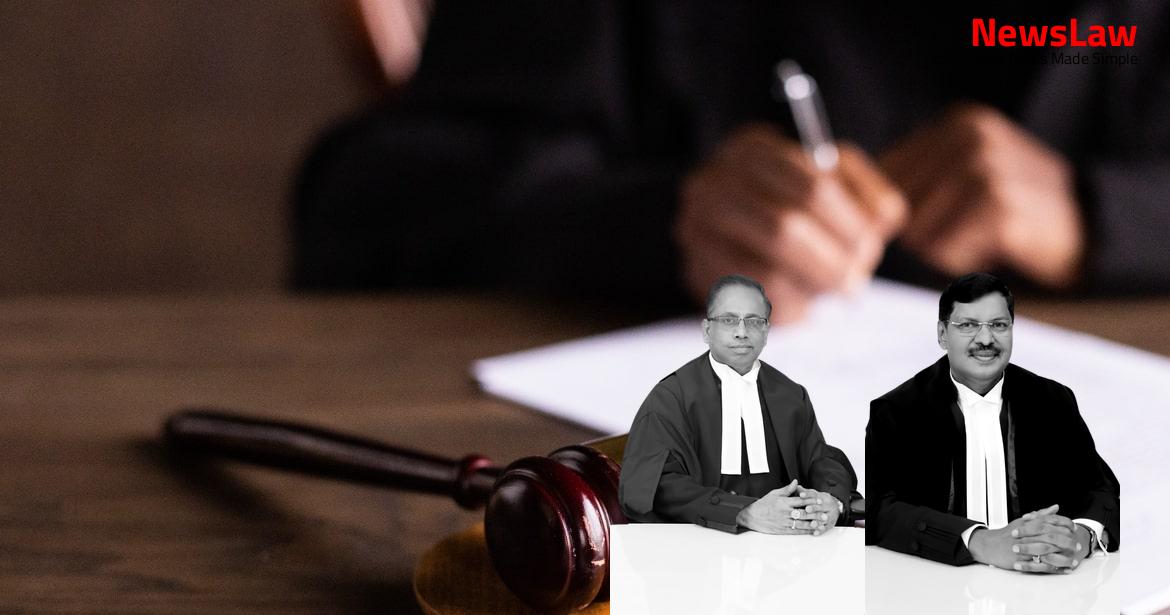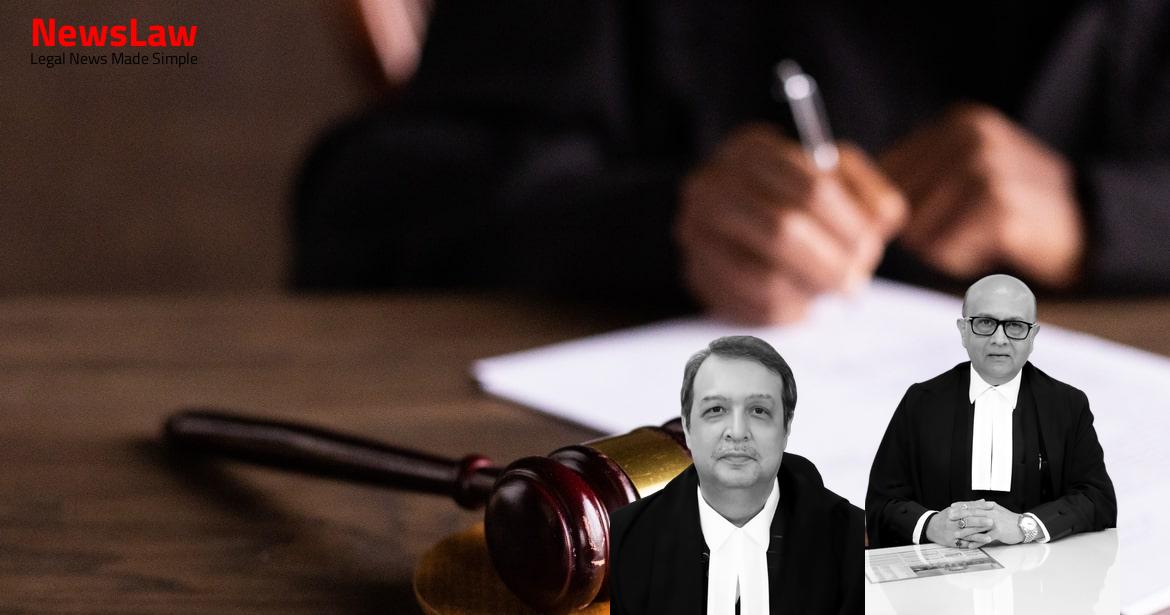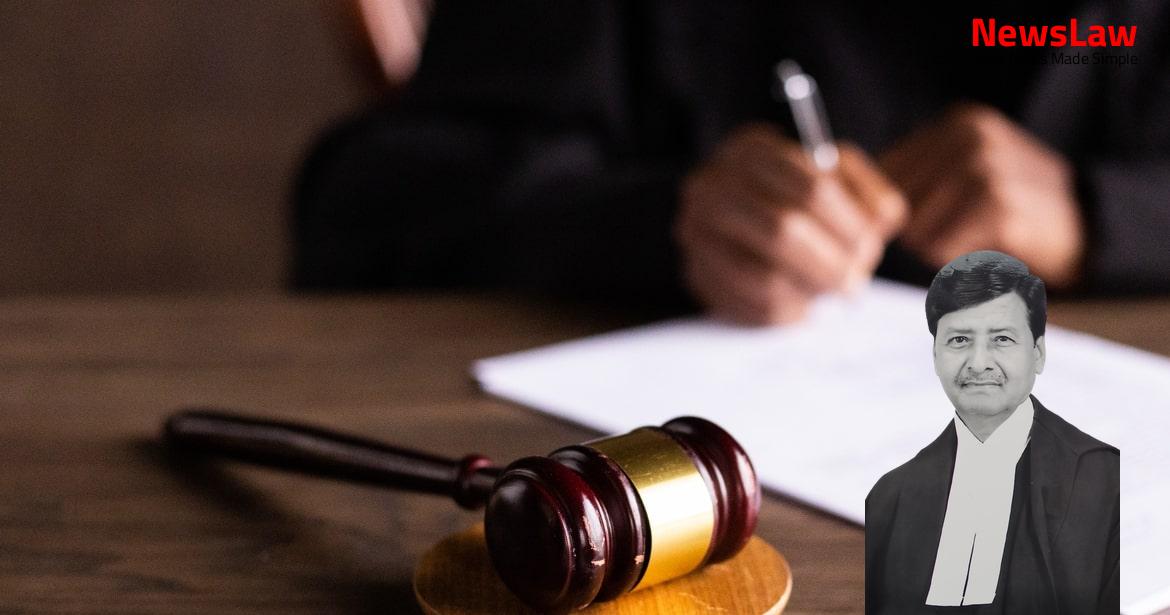In a recent judgment by the Supreme Court of India, the case of illegal gratification and obstruction of a public servant was revisited. The case involved allegations against the appellant in collusion with his wife. The appellant was acquitted of the charges under Section 353 of the IPC. The legal battle shed light on crucial aspects of criminal law and public duty. #SupremeCourt #LegalCase #JudgmentSummary
Facts
- Appellant was originally charged with multiple offences alongside his wife, but in this appeal, only the conviction under Section 353 of the IPC is in question.
- The complaint was filed by Babulal Ahirwar regarding irregularities in construction work, which led to the removal of Santosh Ahirwar from his position.
- The appellant, a Patwari, conducted an inquiry into the complaint against Babulal Ahirwar and allegedly demanded illegal gratification of Rs. 500.
- A trap was organized based on the complaint, and the appellant was apprehended during the proceedings.
- The Special Judge acquitted the appellant of other charges but convicted him under Section 353 of the IPC, sentencing him to six months simple imprisonment and a fine of Rs. 1,000.
- The appellant and his wife denied the charges and claimed trial.
- Special Case No 20 of 2005 was registered against the appellant and his wife for the mentioned offences.
- The prosecution examined thirteen witnesses and the defence examined three witnesses.
- The High Court dismissed the appeal filed by the appellant.
- The allegation under Section 353 of the IPC stated that the appellant, in collusion with his wife, obstructed the members of the trap team from performing their public duty by attacking them or using criminal force.
Also Read: Landmark Judgment: Resolving Dispute Between Corporation and Contractor
Arguments
- Mr. Siddharth Aggarwal argued that the courts were unjustified in convicting under Section 353 of IPC.
- Argued that appellant’s wife was acquitted on the same evidence.
- Contended that the evidence presented does not establish the case for conviction under Section 353 of IPC against the appellant.
- Mentioned that none of the required elements for a Section 353 conviction have been proven.
- Mr. Arjun Garg defended the conviction, stating no grounds for interference with the concurrent conviction.
Also Read: Judgment on Age Relaxation and Bonus Marks in Educational Projects
Analysis
- Assault under Section 351 of the IPC defined as making any gesture or preparation intending to cause apprehension of criminal force.
- Section 353 of the IPC deals with Assault or criminal force to deter public servant from discharging duty.
- Section 353 specifies punishment for assaulting a public servant or using criminal force to prevent them from duty.
- Criminal force is defined as intentional use of force without consent to commit an offense or cause injury, fear, or annoyance.
- Force is defined as causing motion, change, or cessation of motion to another person or substance in contact with them.
- The appellant attempted to wriggle out and jostling and pushing occurred during the arrest.
- No evidence shows that the appellant used any hard or blunt object.
- The wife of the accused tried to pull him out of the jeep and struck her head on it.
- Injuries sustained by the constable were documented, but no evidence of assault or criminal force by the appellant was established.
- Examination of the injuries did not conclusively link them to the appellant using a hard and blunt object.
- The prosecution failed to prove that the appellant assaulted or used criminal force against the trap party.
- The appellant’s actions in trying to escape were not deemed as an intentional use of criminal force.
- The wife of the accused also resisted the arrest proceedings.
- Contrast between Section 353 and Section 186 of the IPC where the appellant was not charged under Section 186.
- Medical examination reports indicated injuries, but the cause was not definitively linked to the appellant using criminal force.
- There is no complaint filed by the officer against the appellant for any offense under Section 186 of the IPC.
- Absence of any allegation or complaint under Section 186 of the IPC by the officer against the appellant is noted.
- The officer has not accused the appellant of committing any offense specified under Section 186 of the IPC.
Also Read: Land Acquisition and Compensation Dispute in Maharashtra
Decision
- The appeal is allowed.
- The Conviction under Section 353 of the IPC and the sentence imposed are set aside.
- The bail bonds shall stand discharged.
- The judgment of the High Court is set aside.
- The appellant is acquitted for the offence under Section 353 of the IPC.
Case Title: MAHENDRA KUMAR SONKER Vs. THE STATE OF MADHYA PRADESH (2024 INSC 600)
Case Number: Crl.A. No.-000520-000520 – 2012



